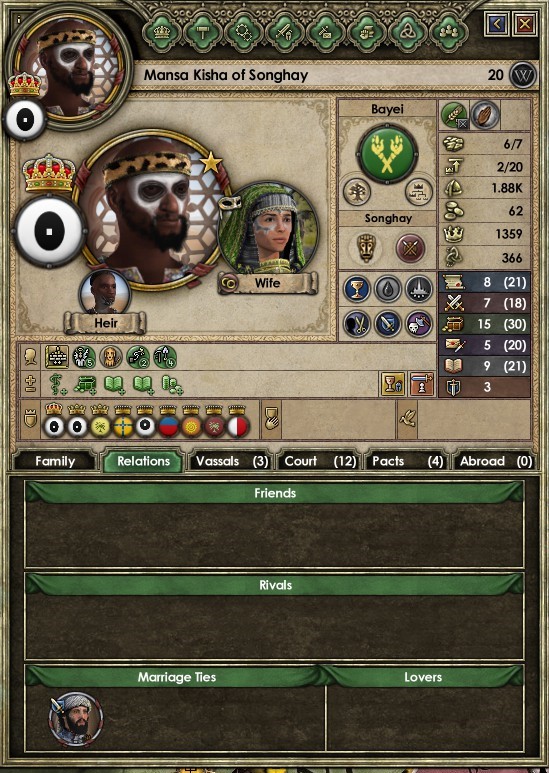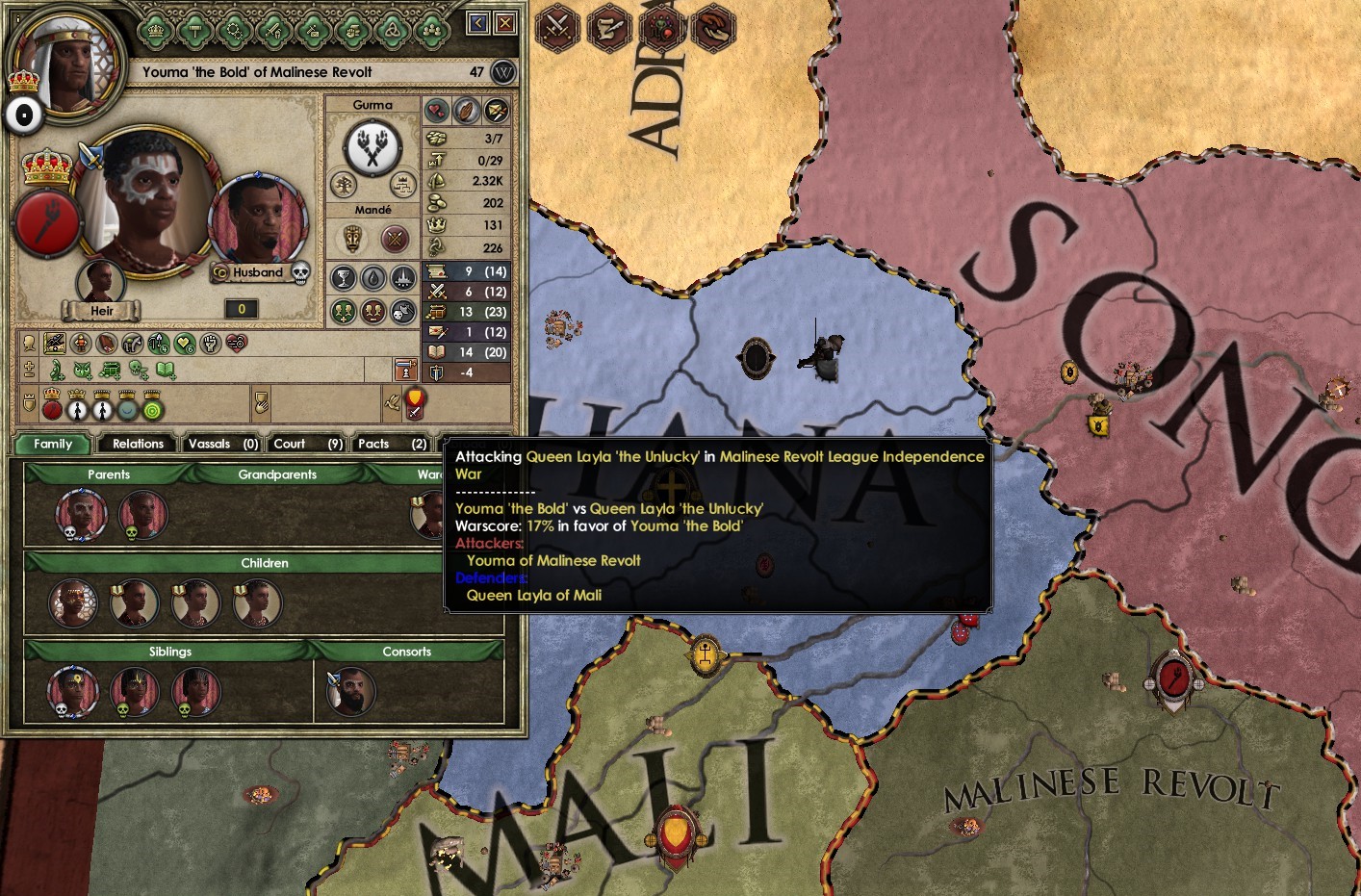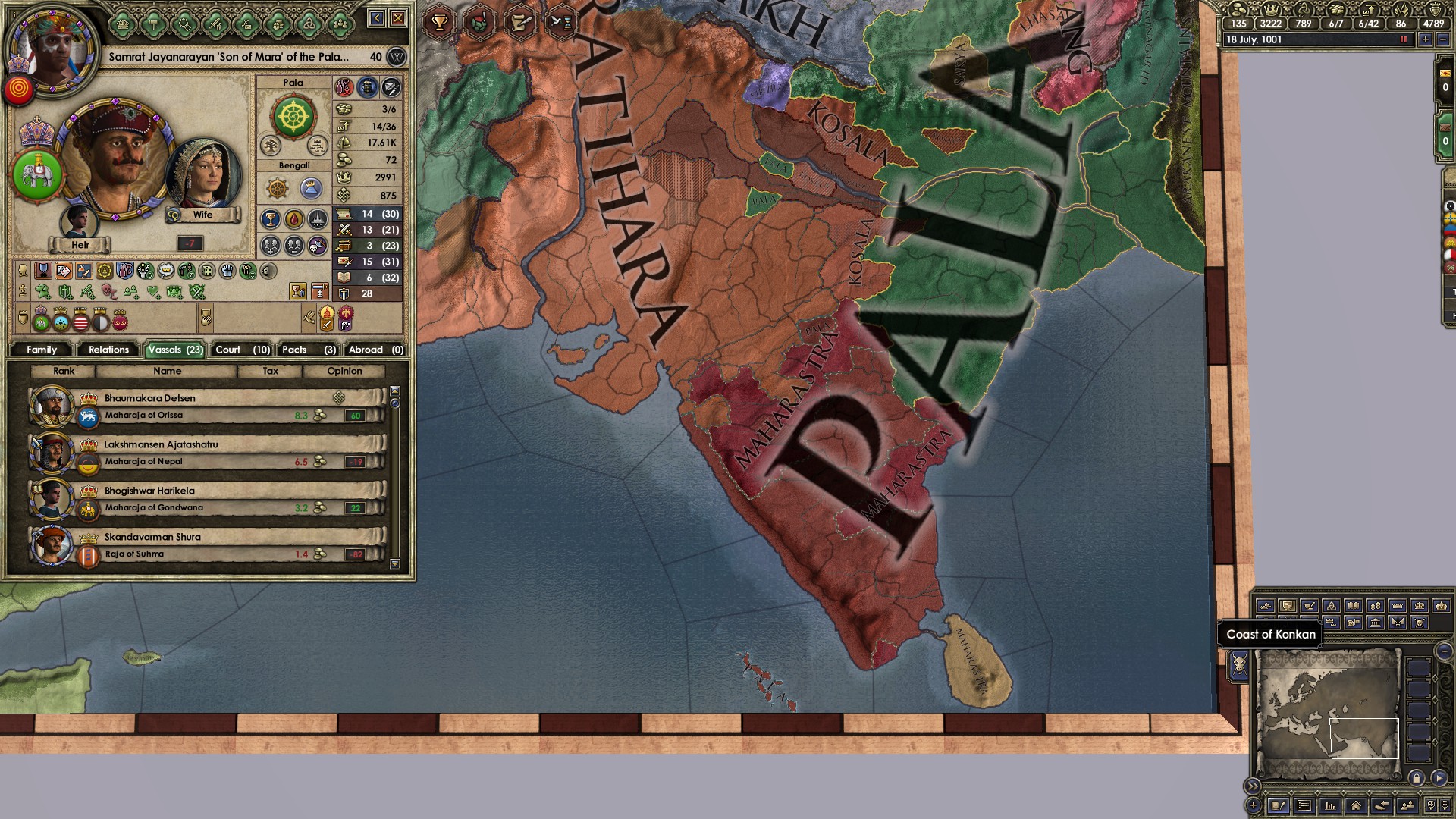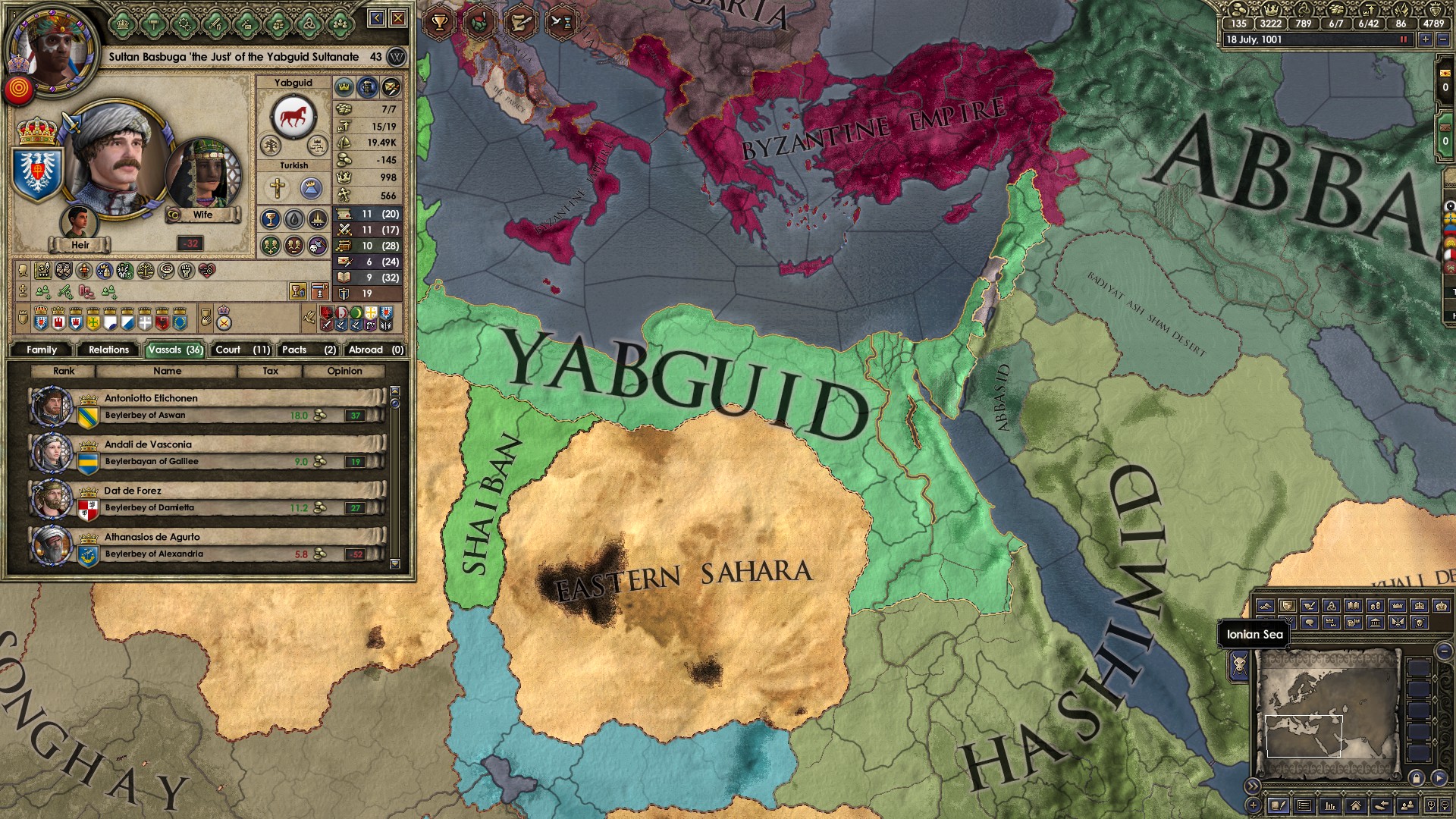Introduction & Chapter 1
Hello everyone! This is my first AAR and I hope you enjoy. I will be playing as the high chiefdom of Songhay, ruled by my custom Bayei dynasty.

The emblem comes from an old story of the dynasty's foundation: Two shining torches (one held by the patriarch, one by the matriarch) crossed in unity on a lush savanna.
While writing this AAR I will try to experiment with different writing styles. So some chapters will be in a more myth/legend format, some in a more traditional character-following style, some in the first person, and so on.
Goals:
- Form Empire of Mali
- Reform and maintain the African pagan faith
- Maintain a strong empire
I have all gameplay DLCs and am using the following custom rules:
- Exclave Independence: Harsh (helps prevent blobbing)
- Devil Worshipers: Off (they're unpleasant for non-silly games)
- Sunset Invasion: Off (ditto)
- Black Plague: Historical (I actually didn't intend this, I just had it on and didn't notice until I was well into the playthrough)
I will also use console commands for storytelling and/or bugfixing purposes, as needed.
I hope you enjoy!
----
"It all started with old Kodama".
The old man stroked his beard in thought as he regarded the three children sitting and listening to his story. The fire warmed his back, and he continued:
"He was Farbas of this land well before you all were born."

"A hard worker was he, willing to put time & effort into any goal. And a good sense of rulership to boot. He was a coward, though, and always got others to do the fighting for his wars."

"He followed the path of the great snake, Bida, and was always trying to get as much money as he could."

"And he waged wars, too. First taking land from a weaker chief to the east, and then forcing the southern chief to kneel to him."

"He was respected for his good justice. He once solved a dispute between two hunters over who got to trap a certain grove, by telling them to both set traps there for a night, and whoever caught more game obviously deserved the grove more. But Kodama was forceful, too, and he's the reason why our Chief has to go visit the Songhay tribe once every two harvests."

"But eventually all his scheming for gold caught up with him, and he died. Indeed, the Great Snake himself appeared at his deathbed to commend him."

"His son, Kisha, was a lot like his father. Patient and hard-working, but also thought higher of other people. He was also an even more talented aministrator, and as soon as he got enough money, he held a grand ceremony declaring himself Mansa of Songhay. Now, Kodama could have done this, but he didn't have enough money while he lived. This is why we call Kodama "Seed-Planter" - he sowed the seeds of Mansa-hood that Kisha reaped.

"Like his father, the new Mansa waged wars to grow his lands. But the trouble came after he subjugated a southern lord."
"During this way, the enemy, Takoi of Manding, managed to besiege and capture the fort of the Songhay tribe. Takpi captured Kisha's wife and two sisters, and made them all his concubines. This enraged Kisha so much that after subjugating Takoi, he immediately tried to imprison him. Takoi returned to the battlefield in revolt, but Kisha defeated him again. He then burnt Takoi at the stake.

"But this angered many Elders, most of whom did not think Takoi's slight merited death. After winning just one more war, a weakness overtook Kisha's body, and he died shortly. This was the spirits' toll for the vengeance he took on Takoi."


"But when Kisha died, the Elders had their final revenge. Kisha had long called himself Musa of both Mali and Songhay. So the Elders gave Songhay to his successor Kikiya... and Mali to Kukiya's sister Layla."

"And that, children, is why we can't go south to hunt anymore."

The emblem comes from an old story of the dynasty's foundation: Two shining torches (one held by the patriarch, one by the matriarch) crossed in unity on a lush savanna.
While writing this AAR I will try to experiment with different writing styles. So some chapters will be in a more myth/legend format, some in a more traditional character-following style, some in the first person, and so on.
Goals:
- Form Empire of Mali
- Reform and maintain the African pagan faith
- Maintain a strong empire
I have all gameplay DLCs and am using the following custom rules:
- Exclave Independence: Harsh (helps prevent blobbing)
- Devil Worshipers: Off (they're unpleasant for non-silly games)
- Sunset Invasion: Off (ditto)
- Black Plague: Historical (I actually didn't intend this, I just had it on and didn't notice until I was well into the playthrough)
I will also use console commands for storytelling and/or bugfixing purposes, as needed.
I hope you enjoy!
----
"It all started with old Kodama".
The old man stroked his beard in thought as he regarded the three children sitting and listening to his story. The fire warmed his back, and he continued:
"He was Farbas of this land well before you all were born."

"A hard worker was he, willing to put time & effort into any goal. And a good sense of rulership to boot. He was a coward, though, and always got others to do the fighting for his wars."

"He followed the path of the great snake, Bida, and was always trying to get as much money as he could."

"And he waged wars, too. First taking land from a weaker chief to the east, and then forcing the southern chief to kneel to him."

"He was respected for his good justice. He once solved a dispute between two hunters over who got to trap a certain grove, by telling them to both set traps there for a night, and whoever caught more game obviously deserved the grove more. But Kodama was forceful, too, and he's the reason why our Chief has to go visit the Songhay tribe once every two harvests."

"But eventually all his scheming for gold caught up with him, and he died. Indeed, the Great Snake himself appeared at his deathbed to commend him."

"His son, Kisha, was a lot like his father. Patient and hard-working, but also thought higher of other people. He was also an even more talented aministrator, and as soon as he got enough money, he held a grand ceremony declaring himself Mansa of Songhay. Now, Kodama could have done this, but he didn't have enough money while he lived. This is why we call Kodama "Seed-Planter" - he sowed the seeds of Mansa-hood that Kisha reaped.

"Like his father, the new Mansa waged wars to grow his lands. But the trouble came after he subjugated a southern lord."
"During this way, the enemy, Takoi of Manding, managed to besiege and capture the fort of the Songhay tribe. Takpi captured Kisha's wife and two sisters, and made them all his concubines. This enraged Kisha so much that after subjugating Takoi, he immediately tried to imprison him. Takoi returned to the battlefield in revolt, but Kisha defeated him again. He then burnt Takoi at the stake.

"But this angered many Elders, most of whom did not think Takoi's slight merited death. After winning just one more war, a weakness overtook Kisha's body, and he died shortly. This was the spirits' toll for the vengeance he took on Takoi."


"But when Kisha died, the Elders had their final revenge. Kisha had long called himself Musa of both Mali and Songhay. So the Elders gave Songhay to his successor Kikiya... and Mali to Kukiya's sister Layla."

"And that, children, is why we can't go south to hunt anymore."
Last edited:
- 2
- 1






























































